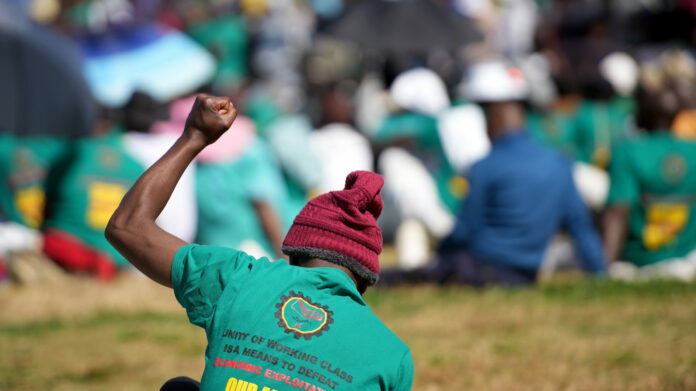
A STRIKE by Sibanye-Stillwater’s gold mine employees played a major part in the 1.6 million work days lost so far this year in South Africa as a result of industrial action, said Bloomberg News.
Citing data in the South African Reserve Bank’s Quarterly Bulletin published today, the newswire said the work days lost represented a 30-fold year-on-year increase. The figure is calculated by multiplying the number of employees on strike with the days they were absent from work, said Bloomberg News.
The increase in working days lost, particularly in the second quarter, was driven by a prolonged wage-related strike at a large gold-mining company, the central bank said. About 31,000 workers at Sibanye Stillwater three gold mines embarked on a three-month strike for higher wages from early March. The protests hit the producer’s gold output, which slumped 63% year-on-yearin the six months through June, said Bloomberg News.
Dissatisfaction over pay was the biggest cause of industrial action in the second quarter, accounting for 99% of work days lost and 85% of strikes, the central bank said. That drove the average wage settlement rate agreed through collective bargaining up to 6.1% in the first half of 2022, from 4.5% a year earlier, it said.
“Despite the increase, the average wage settlement rate was still below the average headline consumer price inflation rate of 6.2% in the first half of 2022,” the central bank said.
Sibanye-Stillwater is currently negotiating with unions regarding wage increases at its platinum group metal mines which began in June. Company spokesperson James Wellsted said today that discussions were ongoing.
Commenting in June, Neal Froneman, CEO of Sibanye-Stillwater said negotiations were unlikely to be resolved speedily. “I don’t think it will be quick outcome,” he said. “Positional bargaining is a process, especially if you are going to achieve an inflation-related wage increase. Maybe there’s a bit more complexity with profit share which could well be the right thing for PGMs.”
Anglo American Platinum (Amplats) made relatively short work of its wage negotiations agreeing on May 26 a five-year wage agreement with unions that increased the total labour cost to company an average 6.6%. Northam Platinum signed a five-year wage pact last year after agreeing an average 6.5% wage increase.










